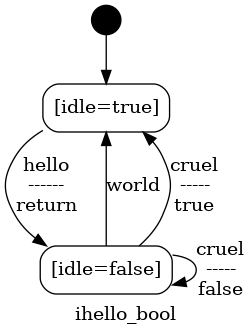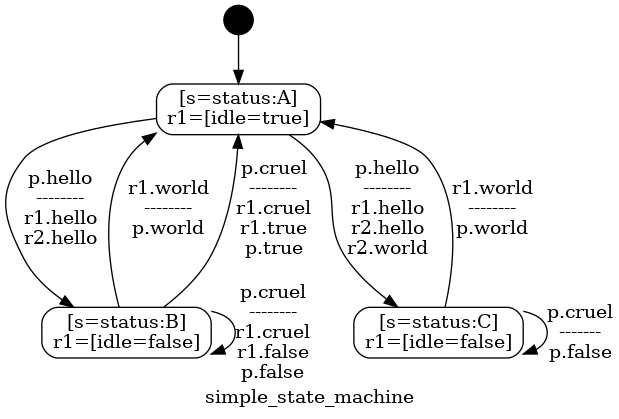Next: A Camera Example, Previous: Hello World!, Up: Getting Started [Contents][Index]
4.2 A Simple State Machine
The ihello_bool interface introduces stateful behavior that is
somewhat more interesting
interface ihello_bool
{
in void hello ();
in bool cruel ();
out void world ();
behavior
{
bool idle = true;
[idle] on hello: idle = false;
[!idle]
{
on cruel: {idle = true; reply (idle);}
on cruel: reply (idle);
on inevitable: {world; idle = true;}
}
}
}
This example introduces some new language aspects
bool idle = true;A boolean state variable, defining
idle=trueas the initial state,[idle]A guard. Only when the expression between the brackets evaluates to
truetheonis eligible to execute. In the initial state, thehellotrigger is the only thing that can occur. The guard and the on are declarative statements. After the declarative statements follows a,idle = false;An imperative statement. When
hellotrigger occurs, the interface transitions to state!idle,on cruel: … on cruel: …A non-deterministic choice3. In the
!idlestate,cruelis accepted; it can either...reply (true)reply
falseand remain not idle, or{idle = true; reply (idle);}execute a compound of two imperative statements: Set the reply value to
trueand transition to the idle state,inevitableIf no
crueltrigger occurs, inevitably theworldaction will occur.inevitableis a modeling event and is not visible on the trail. The effect is thatworldaction now has become decoupled from the caller.
The state diagram (See Invoking dzn graph) depicts this protocol
graphically:

This model is already interesting enough to have the mCRL2 model-checker
verify if all is well (See Invoking dzn verify and See Verification Checks and Errors)
$ dzn -v verify doc/examples/ihello-bool.dzn verify: ihello_bool: check: deadlock: ok verify: ihello_bool: check: unreachable: ok verify: ihello_bool: check: livelock: ok verify: ihello_bool: check: deterministic: ok
which is luckily the case. The model-checker can also be used to
generate all possible4 traces (See Invoking dzn traces)
for ihello_bool:
$ dzn -v traces doc/examples/ihello-bool.dzn
produces three trace files (ihello_bool.trace.0,ihello_bool.trace.1, and ihello_bool.trace.2) with these traces (the order may differ):
- hello,return,world
- hello,return,cruel,true
- hello,return,cruel,false
The sequence for the first trace with the asynchronous world
looks like this
client ihello_bool . : . : .hello : .----------------->: . : . return: .<-----------------: . : . : . world: .<-----------------:
and for the second trace where cruel happens looks like this
client ihello_bool . : . : .hello : .----------------->: . : . return: .<-----------------: . : . : .cruel : .----------------->: . : . true: .<-----------------:
the third trace is looks like this
client ihello_bool . : . : .hello : .----------------->: . : . return: .<-----------------: . : . : .cruel : .----------------->: . : . false: .<-----------------:
You may have noticed that the first two traces start and end in the
initial state, while the third trace starts in the initial state and
ends in the !idle state (also see the corresponding state
diagram).
Now have a look at the component simple_state_machine
import ihello-bool.dzn;
interface iworld
{
in void hello ();
out void world ();
behavior
{
on hello: {}
on hello: world;
}
}
component simple_state_machine
{
provides ihello_bool p;
requires ihello_bool r1;
requires iworld r2;
behavior
{
enum status {A, B, C};
status s = status.A;
[s.A]
{
on p.hello (): {s=status.B; r2.hello (); r1.hello ();}
}
[s.B]
{
on p.cruel (): {if (r1.cruel ()) s=status.A; reply (s.A);}
on r2.world (): s=status.C;
}
[s.B || s.C] on r1.world (): {s=status.A; p.world ();}
[s.C] on p.cruel (): reply (s.A);
}
}
It introduces the following concepts:
enum status {A, B, C}User defined
enumtype namedstatus,[s.A]Field test of enum variable
s: evaluates totrueifshas field valueA, it is equivalent tos == status.A,[s.B || s.C]Logical or
||in guard expression (see See Expressions),on r2.world (): {}A skip statement: upon receiving the
r2.worldtrigger, the component does “nothing” and is ready for the next event. Omitting this line would make the occurrence ofr2.worldillegal.

Verification succeeds
$ dzn -v verify doc/examples/simple-state-machine.dzn verify: ihello_bool: check: deadlock: ok verify: ihello_bool: check: unreachable: ok verify: ihello_bool: check: livelock: ok verify: ihello_bool: check: deterministic: ok verify: iworld: check: deadlock: ok verify: iworld: check: unreachable: ok verify: iworld: check: livelock: ok verify: iworld: check: deterministic: ok verify: simple_state_machine: check: deterministic: ok verify: simple_state_machine: check: illegal: ok verify: simple_state_machine: check: deadlock: ok verify: simple_state_machine: check: unreachable: ok verify: simple_state_machine: check: livelock: ok verify: simple_state_machine: check: compliance: ok
you may want to see what happens to verification or the state diagram when you comment-out a statement of your choosing in the component’s behavior.